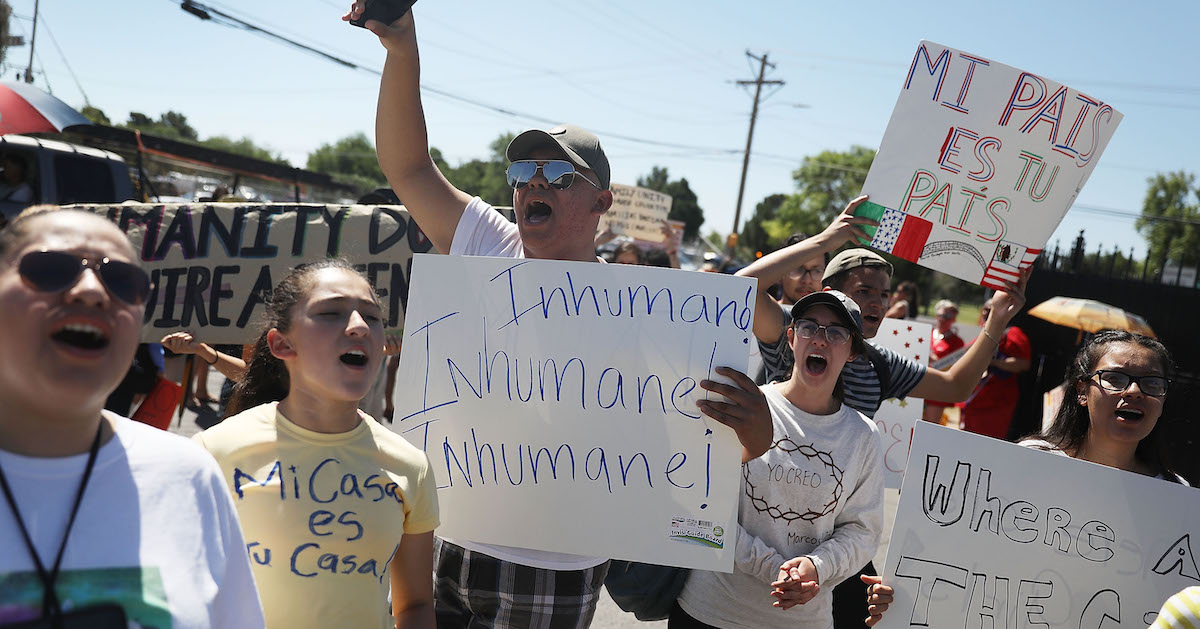
The American Bar Association (ABA) has weighed in on what its calling “credible reports” of inhumane and illegal conditions at federal detention centers. ABA President Bob Carlson said in a statement on Tuesday the organization is “appalled by credible reports of hundreds of children being held in unsafe and unhealthy conditions in violation of federal and state law, court settlements and common decency.”
“This week, the American public learned that children, including infants, were being held for up to weeks at a time in overcrowded federal facilities that lack the most basic of human necessities,” Carlson said. “The law requires that children who are held must be transferred to the custody of Health and Human Services within 72 hours.”
Carlson then referenced a recent argument made a Trump Administration lawyer, namely that the government is not required to provide soap, toothbrushes, or beds to children being held in detention facilities.
“The U.S. Department of Justice has argued that bedding, soap, showers and toothbrushes are not necessary to maintain ‘safe and sanitary’ conditions for immigrant children in federal custody, which are required by the 1997 Flores Settlement Agreement, which restricts the time children can be held in immigration detention and sets minimum standards for their care while in custody,” Carlson continued.
“The ABA calls on federal authorities to immediately end this inhumane and illegal treatment of children and provide attorney access to facilities operated by U.S. Customs and Border Protection. We urge Congress to pass supplemental appropriations to ensure the appropriate treatment and care of unaccompanied immigrant children in government custody,” Carlson concluded. “And we call on the administration to enforce laws and settlements that guarantee humane, minimal standards of care for vulnerable children, no matter how they arrived in our country.”
As Law&Crime reported last week, Justice Department attorney Sarah Fabian asked the U.S. Court of Appeals for the Ninth Circuit to overturn a district court’s order requiring the government to provide detainees with hygiene items such as soap and toothbrushes in order to comply with the “safe and sanitary conditions” requirement set forth in the 1997 Flores Settlement Agreement.
Here’s what Flores Settlement Agreement Carlson referenced says:
[The government] shall hold minors in facilities that are safe and sanitary and that are consistent with the INS’s concern for the particular vulnerability of minors. Facilities will provide access to toilets and sinks, drinking water and food as appropriate, medical assistance if the minor is in need of emergency services, adequate temperature control and ventilation, adequate supervision to protect minors from others, and contact with family members who were arrested with the minor.
Fabian asserted that because the language in Flores did not list soap, toothbrushes, or beds as items specifically required to comply with the agreement, the administration should not have to provide them.
“One has to assume it was left that way and not enumerated by the parties because either the parties couldn’t reach agreement on how to enumerate that or it was left to the agencies to determine,” she said.
“Or it was relatively obvious,” Judge William Fletcher replied. “[A]nd at least obvious enough that if you’re putting people into a crowded room to sleep on concrete floor w aluminum foil blanket on top of them that doesn’t comply with the agreement.”
“It wasn’t perfumed soap, it was soap. That’s part of ‘safe and sanitary.’ Are you disagreeing with that?” he said, adding, “I find that inconceivable that the government would say that that is safe and sanitary.”
The three-judge panel did not appear to find Fabian’s arguments persuasive.
“You’re really going to stand up and tell us that being able to sleep isn’t a question of safe and sanitary conditions?’” asked Judge Marsha Berzon.
“It’s within everybody’s common understanding that if you don’t have a toothbrush, you don’t have soap, you don’t have a blanket, those [conditions] are not safe and sanitary,” Judge A. Wallace Tashima also said.
Jerry Lambe contributed to this report.
[Images via Joe Raedle/Getty Images]